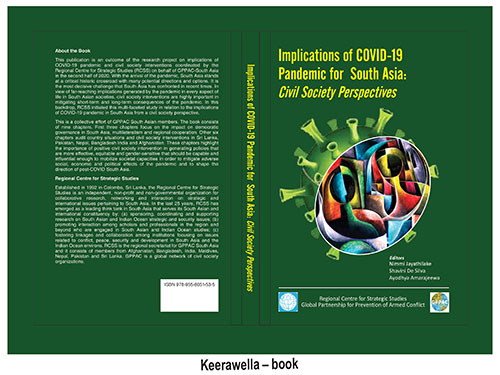Pandemic Policies and Politics in South Asia:-By Kalinga Tudor Silva

Source:Island
Jayathilake, N., De Silva, S. and Amarajeewa, A. eds. Implications of COVID-19 Pandemic for South Asia: Civil Society Perspectives. Colombo: Regional Centre for Strategic Studies in collaboration with Global Partnership for Prevention of Armed Conflict, 2021.
This edited volume published by the Regional Centre for Strategic Studies reflects on the impact of the COVID-19 pandemic on various countries in the South Asian region. This volume differs from much of the emerging body of literature on politics and governance of the pandemic in that it seeks to capture civil society perspectives relating to this public health crisis and humanitarian emergency, with South Asia emerging as a major hotspot of the global pandemic. This is timely and particularly relevant as the pandemic is still unfolding in many parts of South Asia and the related horror stories triggered by the humanitarian crisis in India are presently making global media headlines. As of now, we in Sri Lanka have our own struggle against the virus, with the so-called ‘new year cluster’ attributed to related cultural festivities and the emergence of a more virulent new strain of the virus, triggering a possible third wave of the pandemic. Given all these considerations, this new book deserves our close attention and critical reflection.
The book consists of nine chapters. The first three chapters deal with broader regional and multilateral issues relating to containing the pandemic in South Asia. The remaining chapters review specific country experiences in Sri Lanka, Pakistan, Nepal, Bangladesh, India, and Afghanistan, respectively. The book sets the tone for the volume as follows:
“COVID 19 pandemic is perhaps the most daunting challenge that South Asia has confronted so far in the new millennium. With the outbreak of the pandemic, many unprecedented developments are in motion in South Asia, affecting almost all aspects of social, economic and political life in the region…… South Asia will never be the same after the COVID-19 pandemic.” (p. ix).
Opening chapter by Uyangoda, traces the retreat of democracy and rise of what he calls “executive authoritarianism” particularly in India and Sri Lanka along with the onset of the pandemic. It highlights the systematic way the new regimes in the two countries have consolidated their power deploying exigencies relating to the containment of the pandemic as an excuse to advance authoritarian tendencies, suppress democratic opposition and curtail minority rights in these two of the oldest democracies in Asia. Citizenship Act in India passed immediately before the onset of the pandemic and 20th amendment in Sri Lanka introduced during the pandemic are clear examples of the authoritarian turn in the two countries. Subsequent developments, however, show that playing politics with pandemics, is a rather dangerous game as failures, mismanagement and the resulting public anger can turn against the same rulers who emerged through the pandemic as clearly demonstrated in the outcome of recent elections in India. Also, it must be noted here that the social and political history of epidemic outbreaks indicate that they do not necessarily promote the advancement of autocratic tendencies. They can also result in mass mobilization accompanied by increased democratic participation. For instance, the famous malaria epidemic of 1934-35 did contribute to the politicization of rural masses in Sri Lanka through the mediation of both nationalist and leftist political leaders and the development of the Sri Lankan welfare state as pointed out by several researchers (Jones 2015, Silva 2014, Jayasuriya 2000).
In the second chapter, Joseph and Pandey examine how far the pandemic has contributed towards development of regional cooperation for addressing a formidable common challenge. In their view even though some efforts at multilateral cooperation were made by the South Asian leaders through zoom meetings held at the onset of the pandemic, in the end “each country continued to battle the virus on its own” (P. 31) due to structural problems in SAARC and a variety of unresolved bilateral issues. Even though the chapter says that “there is a realization that COVID-19 is a collective crisis and combating this required coordinated action”, it has not been translated into a concrete program of action at the regional level. The subsequent chapter by Suba Chandran and others argue that the pandemic has served to reinforce conflict dynamics in the region, whether we are talking about bilateral issues between the countries or internal conflict dynamics within each country such as ethnic tensions in Sri Lanka.
Country-specific analysis in chapters four to nine provide empirical support to many of the arguments provided in the previous chapters. Chapter Four on Sri Lanka by Senanayake and others, for instance, points to the militarization of the pandemic response in Sri Lanka and its implications for engagement with minorities and civil society. While the military did play a useful role in terms of expanding health infrastructure and managing quarantine facilities at a time when the state encountered serious resource constraints, the use of military intelligence in contact tracing, the privacy issues encountered by suspected patients and their contacts and any resulting stigmatization processes particularly where socially marginalized vulnerable people on the other side of the law such as substance users are exposed to the pandemic, pose serious problems from the angles of human rights, trust building and compliance. The chapter notes that the pandemic response in Sri Lanka involved the formation of three different task forces set up under section 33 of the constitution. The members of these task forces were handpicked by the president through his inner network of allies and were directly reporting to him with no clear guidelines about the tasks assigned to them and with no accountability to the public at large. What the chapter does not point out is that these politically constituted task forces totally exclude experts in several relevant fields such as social sciences, social work, law and gender relations or any credible representatives of civil society. As a result, when it came to sensitive issues such as addressing the legitimate demand for burial rights by Muslims, task forces did not have any knowledgeable persons who could express their professional opinions on the subject and address the problem sympathetically and following appropriate public health guidelines, also countering unfounded claims by the so-called ‘patriotic scientists’ (Rambukwella 2020).
Chapters on other countries in the region clearly illustrate that civil society is engaged in the struggle against COVID-19 side by side with the state agencies and the private sector in a variety of challenging circumstances and under different political regimes. It is increasingly evident that the struggle against the pandemic is multi-pronged, carried out at economic, social, political, and epidemiological fronts at the same time, long-term and needs to be regularly updated and adapted to changing circumstances. The role of civil society organizations ranges from fund raising, relief services targeting underserved communities in particular, rights-based interventions, advocacy work on behalf of affected people such as women, people with disabilities, migrant workers, urban poor and people in different stages of exposure to the disease, treatment, quarantine and recovery processes. While law enforcement and policing do have a role to play in disease prevention and control, a community-based approach informed by evidence and supported by community leaders at various levels is necessary to promote community mobilization and preparedness, healthy behaviours, compliance, and satisfactory adjustment to the new normal. A purely statist approach to contain the pandemic carried out with a cohort of loyalists, political henchmen and yes men and not guided by a critical reflection on evidence and community responses is bound to fail at this crucial moment when decisions made can make or break the future of humanity.
References
Jayasuriya, L. (2000). Welfarism and Politics in Sri Lanka: Experiences of a Third World Welfare State. Perth: University of Western Australia.
Jones, M. (2015). Sri Lankan Path to Health for All from the Colonial Period to Alma Ata. In A. Medcalf et al. eds. Health for All: The Journey of Universal Health Coverage. Hyderabad: Blackswan.
Rambukwella, Harshana. (2020). Patriotic Science: The Coronavirus Pandemic, Nationalism, and Indigeneity. University of Zurich Political Geography blog, June 3, 2020.
Silva, K.T. (2014). Decolonisation, Development and Disease: A Social History of Malaria in Sri Lanka. Delhi: Orient Blackswan.



















